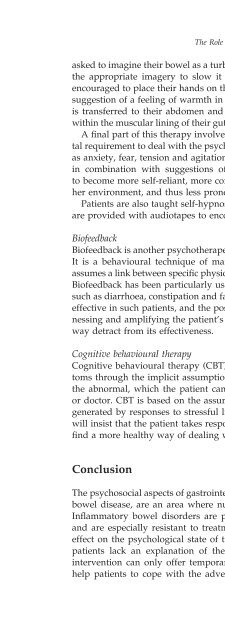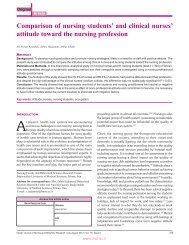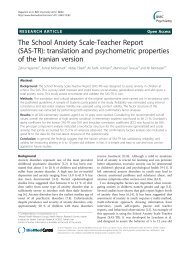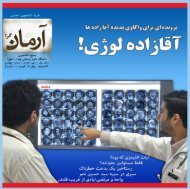Gastrointestinal Nursing.pdf
Gastrointestinal Nursing.pdf
Gastrointestinal Nursing.pdf
Create successful ePaper yourself
Turn your PDF publications into a flip-book with our unique Google optimized e-Paper software.
The Role of Psychosocial Factors in Gastroenterology 177asked to imagine their bowel as a turbulent stream; the therapist then implantsthe appropriate imagery to slow it down. During the therapy patients areencouraged to place their hands on their abdomen. The therapist implants thesuggestion of a feeling of warmth in the patient’s hands; this warm sensationis transferred to their abdomen and the patient is urged to feel the warmthwithin the muscular lining of their gut to induce relaxation and remove tension.A final part of this therapy involves ego-strengthening. This is a fundamentalrequirement to deal with the psychological consequences of an illness, suchas anxiety, fear, tension and agitation. Ego-strengthening techniques are usedin combination with suggestions of symptom relief to enable the patientto become more self-reliant, more confident and more able to adjust to his orher environment, and thus less prone to symptomatic relapse.Patients are also taught self-hypnosis at an early stage of the treatment andare provided with audiotapes to encourage this practice at home.BiofeedbackBiofeedback is another psychotherapeutic technique, used by specialist nurses.It is a behavioural technique of managing gastrointestinal dysfunction andassumes a link between specific physiological response and particular disorders.Biofeedback has been particularly useful in the treatment of bowel disorders,such as diarrhoea, constipation and faecal incontinence. It can be spectacularlyeffective in such patients, and the possibility that it works by suggestion, harnessingand amplifying the patient’s capacity to cure himself does not in anyway detract from its effectiveness.Cognitive behavioural therapyCognitive behavioural therapy (CBT) gives patients control over their symptomsthrough the implicit assumption that their IBS symptoms are related tothe abnormal, which the patient can rectify without consultation to a nurseor doctor. CBT is based on the assumption that IBS is a behavioural disease,generated by responses to stressful life events. The nurse who practises CBTwill insist that the patient takes responsibility for their illness and helps themfind a more healthy way of dealing with the underlying problem.ConclusionThe psychosocial aspects of gastrointestinal disorders, especially inflammatorybowel disease, are an area where nursing care is of the utmost importance.Inflammatory bowel disorders are poorly understood in terms of aetiologyand are especially resistant to treatment. In addition, they have a profoundeffect on the psychological state of the patient and on quality of life. Wherepatients lack an explanation of their condition, and medical and surgicalintervention can only offer temporary relief, at best, good nursing care canhelp patients to cope with the adverse effects of the disease and to adhere















